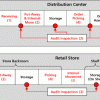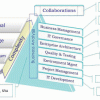Business Transformation Requires Transformational Leaders
Leadership and teaming skills are front and center in times of rapid change. Meet today’s constant disruption head on with expert guidance in leadership, business strategy, transformation, and innovation. Whether the disruption du jour is a digitally-driven upending of traditional business models, the pandemic-driven end to business as usual, or the change-driven challenge of staffing that meets your transformation plans—you’ll be prepared with cutting edge techniques and expert knowledge that enable strategic leadership.
Recently Published
The Power of Thank You
Back in late November 2009, I was conducting a group coaching session and the topic was how to keep staff motivated when, because the economy was so bad, the participants were unable to provide an elaborate party, gifts, or bonuses by end of year. After much brainstorming and discussion, one of the things that everyone agreed to do was to hand-write a thank you note to each of their direct reports.
What Does Mobility Mean for BI?
Mobility is becoming increasingly important to business as the BYOD movement brings powerful tablets and smartphones to the enterprise. Mobile business intelligence has proven popular in recent years, principally by offering a means for busy executives and salespeople on-the-go to carry with them instant access to important indicators. Mobile BI capable of reaching back to analytics on the corporate server or in the cloud could be served up from dedicated apps on mobile platforms or accessed through mobile-friendly webpages.
What Does Mobility Mean for BI?
Mobility is becoming increasingly important to business as the BYOD movement brings powerful tablets and smartphones to the enterprise. Mobile business intelligence has proven popular in recent years, principally by offering a means for busy executives and salespeople on-the-go to carry with them instant access to important indicators.
Avoiding Method Friction: A CAMS-Based Perspective
Organizations, especially large and global ones, are inundated with methods for everything. There are methods, processes, standards, frameworks, guidelines, and policies that apply in development, quality, governance, project management, and architecture — at varying levels in an organization. These methods and their variances are “owned” by roles.
In the high-pressure retail environment of the 21st century, industry leaders looking for every competitive advantage are increasingly relying on analytics. This Executive Update explores how to blend analytics with behavioral research for operational success.
Avoiding Method Friction: A CAMS-Based Perspective
The Power of Thank You
When you first started to talk, after "Dada," "Mama," "cat," and "dog," your parents probably taught you the importance of saying, "please" and "thank you." For most toddlers, "please" comes fairly easily. When you say "please" you're more likely to get what you want. The cause and effect is immediate. But "thank you" -- as I'll explain in this Executive Update -- is another story. "Thank you" is about goodwill -- and the future.








